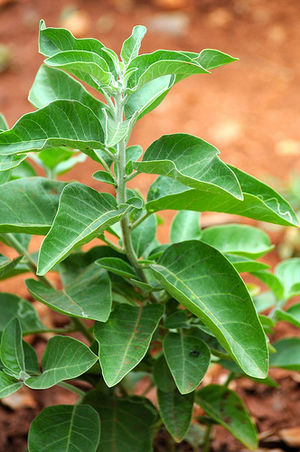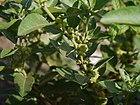Note: This is a project under development. The articles on this wiki are just being initiated and broadly incomplete. You can Help creating new pages.
Difference between revisions of "Withania somnifera - Ashwagandha"
(→Identification) |
|||
| (57 intermediate revisions by 7 users not shown) | |||
| Line 1: | Line 1: | ||
| − | ''' | + | [[File:ashwagandha.jpg|thumb|right|''Ashwagandha'']] |
| + | '''Withania somnifera''' is a herb which is being used in ayurvedic medicines since our ancient times. It plays a major role in the regulation of '''vata dosha''' which is one of the fundamental bioelement. | ||
| − | [[ | + | ==Uses== |
| + | {{Uses|Weight loss}}, {{Uses|Rheumatism}}, {{Uses|Joint pain}}, {{Uses|Sexual debility}}, {{Uses|Thyroid}}, {{Uses|Inflammation}}, {{Uses|Pimples}}, {{Uses|Diarrhea}}, {{Uses|Sore throats}}, {{Uses|Increases strength}}, {{Uses|Rejuvinative}}, {{Uses|Insomnia}}, {{Uses|Weakness}}, {{Uses|Aphrodisiac}}. | ||
| + | |||
| + | ==Parts Used== | ||
| + | {{Parts Used|Dried folaige}}. | ||
| + | |||
| + | ==Chemical Composition== | ||
| + | The ashwagandha consists of alkaloids and steroidal lactones. Withanine is the main alkaloid, where as somniferine, somnine, somniferinine, withananine, pseudo-withanine, tropine, pseudo tropine, choline, cuscohygrine, isopelletierine, anaferine, anahydrine<ref name="chemical composition"/> | ||
| + | |||
| + | ==Common names== | ||
| + | {{Common names|kn= ಅಂಗಾರ ಬೇರು Angara beru, ಅಶ್ವಗಂಧ Ashwagandha|ml= Amukkuram, Pevetti|sa= Ashvagandha|ta= Amukkira |te= Ashwagandha|hi= Asgandh, Ashwagandha|en=Ashwagandha, Indian ginseng|mr=Ashwagandha, Askanda|gu= Aksand, Asvagandha}} | ||
| + | <ref name="Common names"/> | ||
| + | |||
| + | ==Properties== | ||
| + | Reference: Dravya - Substance, Rasa - Taste, Guna - Qualities, Veerya - Potency, Vipaka - Post-digesion effect, Karma - Pharmacological activity, Prabhava - Therepeutics. | ||
| + | ===Dravya=== | ||
| + | |||
| + | ===Rasa=== | ||
| + | Tikta (Bitter), Kashaya (Astringent) | ||
| + | ===Guna=== | ||
| + | Laghu (Light), Ruksha (Dry), Tikshna (Sharp) | ||
| + | ===Veerya=== | ||
| + | Ushna (Hot) | ||
| + | ===Vipaka=== | ||
| + | Katu (Pungent) | ||
| + | ===Karma=== | ||
| + | Kapha, Vata | ||
| + | ===Prabhava=== | ||
| + | |||
| + | ==Habit== | ||
| + | {{Habit|Herb}} | ||
| + | |||
| + | ==Identification== | ||
| + | ===Leaf=== | ||
| + | {{Leaf|Simple||The leaves are alternate, simple, margins entire to slightly wavy, broadly ovate, obovate or oblong, 30-80 mm long and 20-50 mm broad}}<ref name="Leaf"/> | ||
| + | |||
| + | ===Flower=== | ||
| + | {{Flower|Bisexual|2-5 mm long|Yellow|5|The 1-7 inconspicuous bisexual flowers appear at the leaf nodes on 2-5 mm long stalks, Flowering season is July-September}} | ||
| + | |||
| + | ===Fruit=== | ||
| + | {{Fruit|Oblong|5-8 mm|The fruit is a hairless spherical berry|Orange-red to red when ripe and enclosed by the enlarged calyx|-|Fruiting season is July-September}} | ||
| + | |||
| + | ===Other features=== | ||
| + | |||
| + | ==List of Ayurvedic medicine in which the herb is used== | ||
| + | * [[Ashwagandhadi lehyam]] | ||
| + | * [[Ashwagandharishta]] | ||
| + | * [[Balashwagandhadi taila]] | ||
| + | <ref name="Ayurvedic preparations"/> | ||
| + | |||
| + | ==Where to get the saplings== | ||
| + | ==Mode of Propagation== | ||
| + | {{Propagation|Seeds}}, {{Propagation|Cuttings}}. | ||
| + | |||
| + | ==How to plant/cultivate== | ||
| + | A fairly easily grown plant, it requires a warm sheltered position in full sun and a well-drained moderately fertile soil<ref name="How to plant/cultivate"/> | ||
| + | |||
| + | ==Commonly seen growing in areas== | ||
| + | {{Commonly seen|Open places}}, {{Commonly seen|Cold areas}}. | ||
| + | |||
| + | ==Photo Gallery== | ||
| + | <gallery class="left" caption="" widths="140px" heights="140px"> | ||
| + | Amukkira (Tamil- அமுக்கிரா) (21775623692).jpg | ||
| + | |||
| + | Amukkuram (Malayalam- അമുക്കുരം) (21761211786).jpg | ||
| + | |||
| + | File:Withania somnifera kz03.jpg|Leaves | ||
| + | An image of Withania somnifera.JPG | ||
| + | |||
| + | |||
| + | File:Withania somnifera 04.jpg|Flower | ||
| + | |||
| + | Ashvagandha.jpg | ||
| + | |||
| + | File:Withania somnifera MHNT.BOT.2012.10.13.jpg|Fruits | ||
| + | |||
| + | </gallery> | ||
| + | |||
| + | ==References== | ||
| − | + | <references> | |
| + | <ref name="chemical composition">[http://www.cricketfundas.com/health-fundas/ashwagandha-chemical-constituents-uses-and-synonyms/ Chemical constituents"]</ref> | ||
| + | <ref name="Common names">[https://sites.google.com/site/indiannamesofplants/via-species/w/withania-somnifera Common names]</ref> | ||
| + | <ref name="Leaf">[http://pza.sanbi.org/withania-somnifera Plant description]</ref> | ||
| + | <ref name="Ayurvedic preparations">[https://easyayurveda.com/2014/06/22/ashwagandha-withania-somnifera-benefits-dose-side-effects/ Ayurvedic preparations]</ref> | ||
| + | <ref name="How to plant/cultivate">[https://www.pfaf.org/user/Plant.aspx?LatinName=Withania+somnifera Cultivation details]</ref> | ||
| + | </references> | ||
| − | + | ==External Links== | |
| + | * [https://www.sciencedirect.com/topics/agricultural-and-biological-sciences/withania-somnifera Withania somnifera on science direct] | ||
| + | * [https://nootriment.com/ashwagandha-leaves/ Withania somnifera on nootriment.com] | ||
| + | * [http://withaniasomnifera.com/ Withania somnifera on withaniasomnifera.com] | ||
| − | + | [[Category:Herbs]] | |
| − | + | [[Category:Ayurvedic herbs that don't have seed photos]] | |
| − | + | [[Category:Solanaceae]] | |
| − | |||
| − | |||
Latest revision as of 16:44, 20 May 2021
Withania somnifera is a herb which is being used in ayurvedic medicines since our ancient times. It plays a major role in the regulation of vata dosha which is one of the fundamental bioelement.
Contents
- 1 Uses
- 2 Parts Used
- 3 Chemical Composition
- 4 Common names
- 5 Properties
- 6 Habit
- 7 Identification
- 8 List of Ayurvedic medicine in which the herb is used
- 9 Where to get the saplings
- 10 Mode of Propagation
- 11 How to plant/cultivate
- 12 Commonly seen growing in areas
- 13 Photo Gallery
- 14 References
- 15 External Links
Uses
Weight loss, Rheumatism, Joint pain, Sexual debility, Thyroid, Inflammation, Pimples, Diarrhea, Sore throats, Increases strength, Rejuvinative, Insomnia, Weakness, Aphrodisiac.
Parts Used
Chemical Composition
The ashwagandha consists of alkaloids and steroidal lactones. Withanine is the main alkaloid, where as somniferine, somnine, somniferinine, withananine, pseudo-withanine, tropine, pseudo tropine, choline, cuscohygrine, isopelletierine, anaferine, anahydrine[1]
Common names
| Language | Common name |
|---|---|
| Kannada | ಅಂಗಾರ ಬೇರು Angara beru, ಅಶ್ವಗಂಧ Ashwagandha |
| Hindi | Asgandh, Ashwagandha |
| Malayalam | Amukkuram, Pevetti |
| Tamil | Amukkira |
| Telugu | Ashwagandha |
| Marathi | Ashwagandha, Askanda |
| Gujarathi | Aksand, Asvagandha |
| Punjabi | NA |
| Kashmiri | NA |
| Sanskrit | Ashvagandha |
| English | Ashwagandha, Indian ginseng |
Properties
Reference: Dravya - Substance, Rasa - Taste, Guna - Qualities, Veerya - Potency, Vipaka - Post-digesion effect, Karma - Pharmacological activity, Prabhava - Therepeutics.
Dravya
Rasa
Tikta (Bitter), Kashaya (Astringent)
Guna
Laghu (Light), Ruksha (Dry), Tikshna (Sharp)
Veerya
Ushna (Hot)
Vipaka
Katu (Pungent)
Karma
Kapha, Vata
Prabhava
Habit
Identification
Leaf
| Kind | Shape | Feature |
|---|---|---|
| Simple | The leaves are alternate, simple, margins entire to slightly wavy, broadly ovate, obovate or oblong, 30-80 mm long and 20-50 mm broad |
Flower
| Type | Size | Color and composition | Stamen | More information |
|---|---|---|---|---|
| Bisexual | 2-5 mm long | Yellow | 5 | The 1-7 inconspicuous bisexual flowers appear at the leaf nodes on 2-5 mm long stalks, Flowering season is July-September |
Fruit
| Type | Size | Mass | Appearance | Seeds | More information |
|---|---|---|---|---|---|
| Oblong | 5-8 mm | The fruit is a hairless spherical berry | Orange-red to red when ripe and enclosed by the enlarged calyx | - | Fruiting season is July-September |
Other features
List of Ayurvedic medicine in which the herb is used
Where to get the saplings
Mode of Propagation
How to plant/cultivate
A fairly easily grown plant, it requires a warm sheltered position in full sun and a well-drained moderately fertile soil[5]
Commonly seen growing in areas
Photo Gallery
References
External Links
- Ayurvedic Herbs known to be helpful to treat Weight loss
- Ayurvedic Herbs known to be helpful to treat Rheumatism
- Ayurvedic Herbs known to be helpful to treat Joint pain
- Ayurvedic Herbs known to be helpful to treat Sexual debility
- Ayurvedic Herbs known to be helpful to treat Thyroid
- Ayurvedic Herbs known to be helpful to treat Inflammation
- Ayurvedic Herbs known to be helpful to treat Pimples
- Ayurvedic Herbs known to be helpful to treat Diarrhea
- Ayurvedic Herbs known to be helpful to treat Sore throats
- Ayurvedic Herbs known to be helpful to treat Increases strength
- Ayurvedic Herbs known to be helpful to treat Rejuvinative
- Ayurvedic Herbs known to be helpful to treat Insomnia
- Ayurvedic Herbs known to be helpful to treat Weakness
- Ayurvedic Herbs known to be helpful to treat Aphrodisiac
- Herbs with Dried folaige used in medicine
- Herbs with common name in Kannada
- Herbs with common name in Hindi
- Herbs with common name in Malayalam
- Herbs with common name in Tamil
- Herbs with common name in Telugu
- Herbs with common name in Marathi
- Herbs with common name in Gujarathi
- Herbs with common name in Sanskrit
- Herbs with common name in English
- Habit - Herb
- Index of Plants which can be propagated by Seeds
- Index of Plants which can be propagated by Cuttings
- Herbs that are commonly seen in the region of Open places
- Herbs that are commonly seen in the region of Cold areas
- Herbs
- Ayurvedic herbs that don't have seed photos
- Solanaceae







